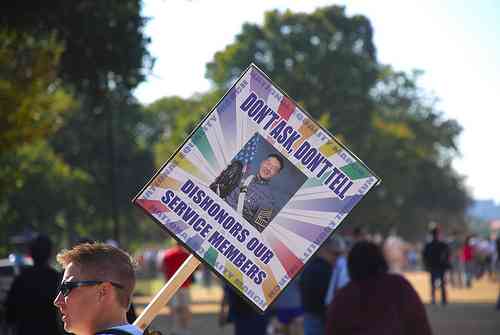No Special Exception for the ROTC Program

Previously, such activities were prohibited due to the ROTC program’s discriminatory “Don’t Ask, Don’t Tell” policy (DADT), which does not allow openly homosexual individuals to participate. The Eagle editorial staff believes that, despite the fact that this move would represent acceptance of a “group with a distinct anti-gay policy,” we should allow an exception in this “single instance.”
Unlike the editorial staff at The Eagle, my concern is not that allowing ROTC on campus might hurt AU’s “image” as an LGBT friendly school, but rather that the move represents a clear violation of the AU’s non-discrimination policy and would allow for a discriminatory organization access to AU facilities and resources.
We should be proud of the fact that our school holds true to its non-discrimination policy, which states that “non-discrimination and equal opportunity” apply to “every aspect of the operations and activities of the university.”
Enforcing this non-discrimination policy would be easy if groups like the Westboro Baptist Church or the American Nazi Party were attempting to establish chapters on campus. However, we need to recognize that the true test of these policies is not in banning groups that are widely scorned, but in standing up to institutions that are widely respected—like the American military.
AU’s refusal to allow the ROTC on campus is one of many efforts from universities across the nation to stand up against discrimination and push for the repeal of DADT. Efforts like these have changed the conversation about DADT within the military and the nation. For one, the enforcement of AU’s non-discrimination policy sends an influential message to the public and military alike that the DADT policy should be repealed. It also forces the military to reconsider the practical implications of its policies, as its critical training and recruiting efforts are curtailed at AU and universities across the nation.
Unfortunately, the editorial staff does not make the connection between the anti-discrimination efforts of American University and the eventual repeal of DADT, saying they eagerly “await” its repeal, as though the public and the university can play no role in this decision. As students, we have more power than you may think. The US military’s top leadership recently pushed for the repeal of DADT. That’s a strong indicator that our efforts are working.
It is certainly regrettable that AU students participating in the ROTC face are inconvenienced by these policies. But this isn’t because AU has been a consistent enforcer of its non-discrimination policy. Rather, the blame lies with the military for continuing an unjust and discriminatory policy.






